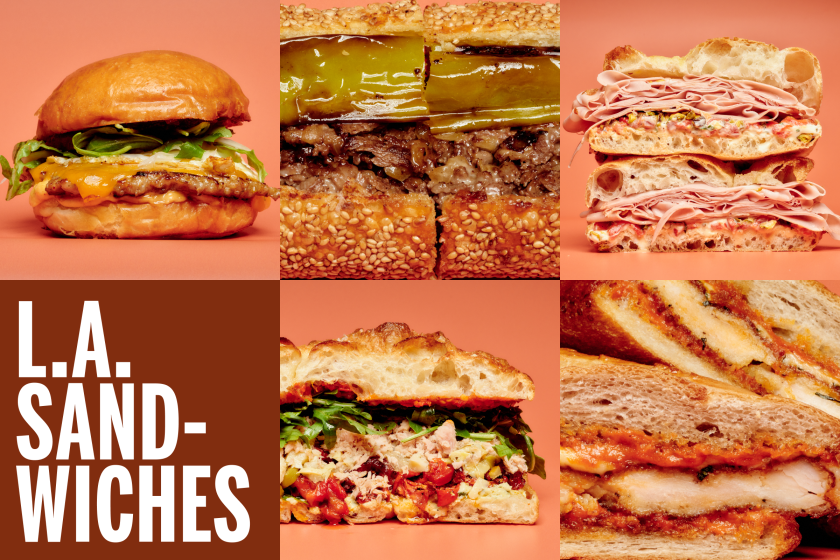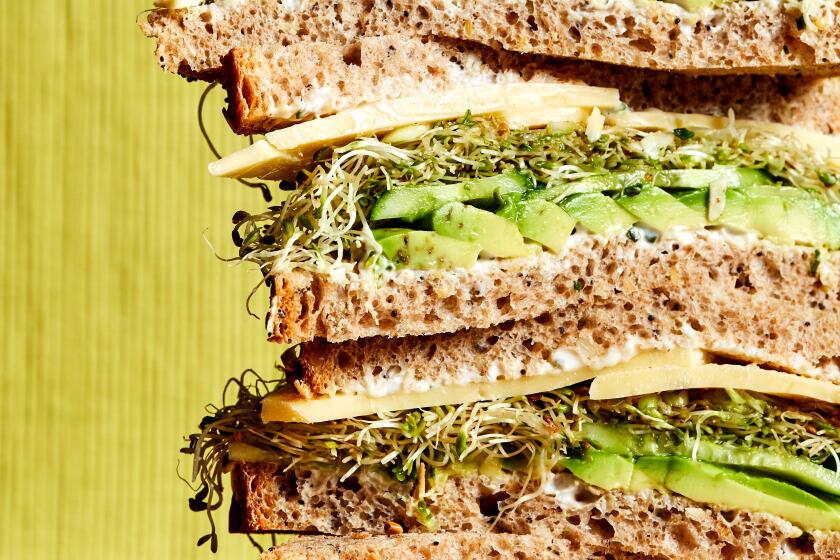Pupusa-O-Rama
Consider the pupusa : a dense, griddle-baked corn thing filled with goodies, a UFO-shaped Salvadoran snack that is something like a shotgun wedding between a tortilla and an Italian calzone. When a pupusa is good, it is very, very good--crisp-edged and speckled brown, hot-corn fragrant, oozing salty melted cheese. When confronted with a pupusa , you may want to garnish it with a bit of the spicy Salvadoran cabbage slaw curtido that is always served alongside, and perhaps with a splash of tomato sauce from a cruet. Like a roadside hamburger, even when a pupusa is bad, it is still pretty swell.
As ice cream comes in strawberry, chocolate and vanilla, pupusas come stuffed with either cheese, sometimes flavored with a Salvadoran vegetable, loroco , that looks a little like asparagus but has a sharpness something like capers; or with chicharrones , bits of fried pork skin, or revueltas , a mixture of cheese and chicharrones and--sometimes--beans. (It is often hard to imagine getting less than everything: my usual order is revueltas .)
Pupusas are generally served at Salvadoran specialty restaurants, pupuserias , of which there are hundreds in central Los Angeles alone. Occasionally, Salvadoran restaurants seem very much alike--volcano posters, swaying music, and an unchanging menu of fried plantains, small grilled steaks and pupusas-- but they also tend to be dependable and cheap.
Last week, I spent a couple of afternoons flitting from place to place, trying to figure out what a perfect pupusa might be, and while I didn’t come up with anything approaching an archetype--there are several styles that I think are equally good--I ate a lot of good food. And I can think of at least a dozen pupusas that I like but didn’t have time to get around to, among them the greasy, delicious pupusas sizzled in oil at the big swap meet at 45th and Alameda; the plain cheese pupusas at El Sataneco on Pico; the fat, loroco -filled pupusas at Papaturro on Beverly; pretty much everything on the menu at El Nica.
Atlacatl is on the swank side, maybe one of the best full-service Salvadoran restaurants in town, with a CD jukebox and wonderful tamarind drinks, and terrific chicken with onions. Pupusas here serve mostly as appetizers, though pretty much everybody here seems to get one or two, and they’re great, especially the revueltas : clear corn flavor from the crisp masa shell, large amounts of milky, salty cheese and a great, almost caramelized roast pork. I especially love the burnt, leathery amoebas of porky cheese that had oozed onto the grill, probably a technical flaw but a nice thing to find.
Down the street, the bare-bones Usuluteco is sometimes considered the classic Los Angeles pupuseria , and on weekends the lines are long, and people stagger out of the restaurant with great armfuls of steaming pupusas -to-go. The pupusas are very good here, thin-shelled, very crisp but somehow pliant, filled with great gobbets of cheese, beans and pulverized pork, the kind you feel you could eat 20 of: an epitome of the pupusa as street food. The similarly named but separate Usulutan in Silver Lake has pupusas proper though somewhat bland, but spiced up with spicy ultra-fresh curtido.
Restaurant Cabana may have been the first place I ever ate a pupusa back when the space housed El Mr. Cat No. 1, but although the fork-wielding cat is still painted above the front door, the pupusas were only of average quality in this pleasant dining room, slightly rubbery and with curtido that tasted uncannily like deli coleslaw.
At Ilopango, a cheerful, converted fast-food stand near Loyola High School, the pupusas were over-fried into a carbonized stiffness. El Pulgarcito, attached to a market across the street from Westlake Park, is well known for its pupusas made from rice flour, which were tasty if more crunchy than crisp. La Teclena is a real big-city kind of place on the busy corner of Vermont and Pico, the former site of a Mexican restaurant Mimi Sheraton called the city’s best, and the pupusas were fine if not startlingly good--there was a strong taste of overcooked pork.
Texis is one of the most reliable of the chains, decked out with a million neon signs and a riot of silver foliage, and the pupusas are a little careful, almost tender rather than crisp, with a mild smack of corn. El Amancer is a homey place whose pupusas are on the soft side, with neither crust nor crunch but a certain richness and a distinctive, tart-hot slaw: a house style that may change the way you think about pupusas.
But even at the meanest takeout stand, a pupusa is handmade in a way that, say, tacos rarely are--patted to order, toasted brown, served just at the point when it has been transformed from masa into thing. It is always comforting to hear the predictable slap-slap of your pupusa being made about 30 seconds after you have placed your order.
Atlacatl, 301 N. Berendo St., Los Angeles, (213) 663-1484.
El Amancer, 3059 West 8th St., Los Angeles, (213) 832-2591.
El Pulgarcito, 2226 West 7th St., Los Angeles, (213) 380-7825.
Ilopango, 1744 W. Venice Blvd., Los Angeles, (213) 766-8860.
La Teclena, 2500 W. Pico Blvd., Los Angeles, (213) 389-4869.
Restaurant Usulutan, 2903 Sunset Blvd., Los Angeles , (213) 664-6650.
Restaurant Cabana, 1003 S. Hill St., Los Angeles, (213) 746-6122.
Texis No. 3, 7th Street at Vermont Avenue, Los Angeles, (213) 387-8090.
Usuluteco, 4021 W. Beverly Blvd., Los Angeles, (213) 663-9919.
caption
More to Read
Eat your way across L.A.
Get our weekly Tasting Notes newsletter for reviews, news and more.
You may occasionally receive promotional content from the Los Angeles Times.











